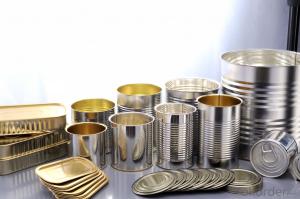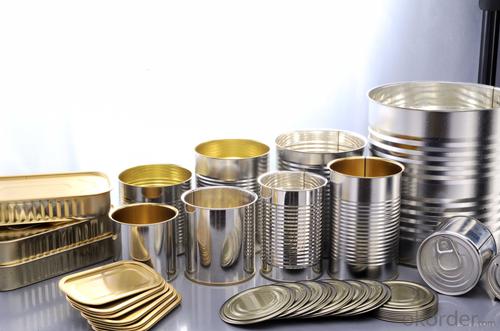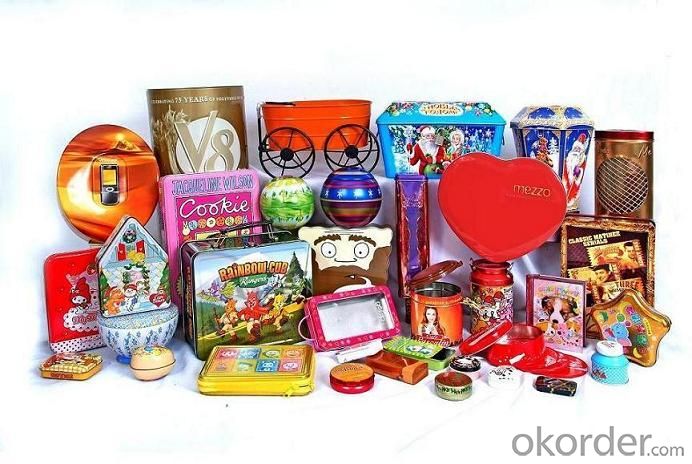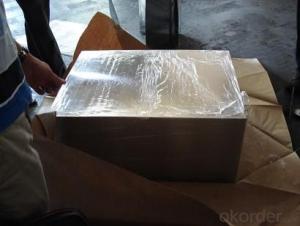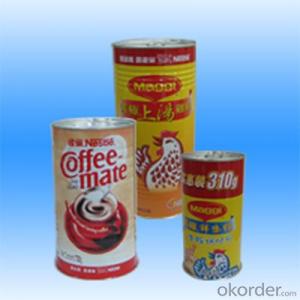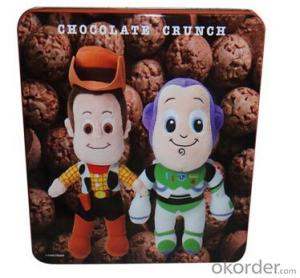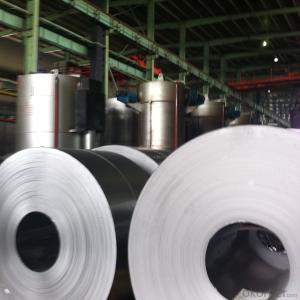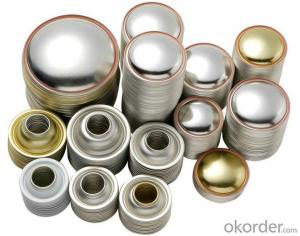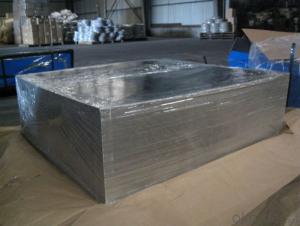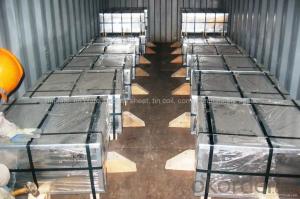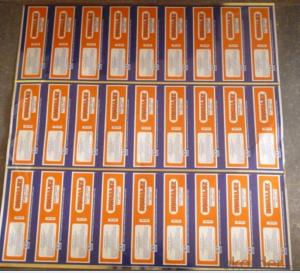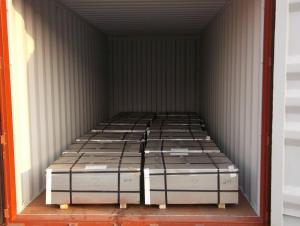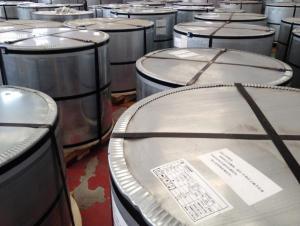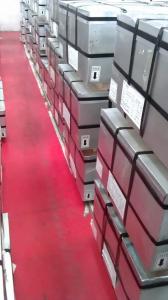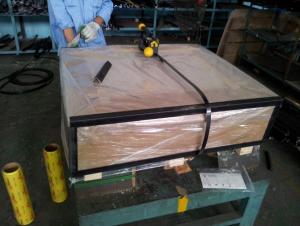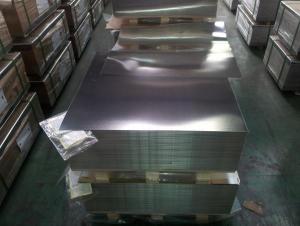Prime Tinplate For Paint Cans, SPCC Material
- Loading Port:
- China main port
- Payment Terms:
- TT OR LC
- Min Order Qty:
- 25 m.t
- Supply Capability:
- 40000 m.t/month
OKorder Service Pledge
OKorder Financial Service
You Might Also Like
Specification
1.Usage
Tinplate is widely used for making all types of containers, containing industrial usage such as paint can, oil can, aerosol cans etc., and food cans like milk powder cans, tomato paste can, dry food cans etc.
2. Quality
As a state owned company and a large tinplate supplier in China, our tinplate quality ranks 1st level in China, similar to Bao Steel, Posco etc.
3. CA Line Production Range
Temper | Thickness(mm) | Width(mm) | Length(mm) |
T3CA | 0.19~0.20 | 800~900 | 520~1068 |
0.21~0.25 | 800~950 | ||
0.26~0.45 | 800~1050 | ||
T4CA | 0.17~0.20 | 800~950 | |
0.20~0.45 | 800~1050 | ||
T5CA | 0.17~0.20 | 800~950 | |
0.20~0.28 | 800~1050 |
4. Our factory photo & equipments

4. Our Overseas Wareouses:
we are having and will built more than 10 overseas warehouses all over the word, located in KSA, UAE, Oman, Russia, Kuwait, Qatar, Oman, Chile, Brazil etc.
5. FAQ
a. what's the annual output?
about 500,000 tons per year.
b. where's the raw matrial from?
our hot rolled coil is purchased from Capital Steel and other state owned mill, with quite good quality.
c. how long is the delivery time?
normally for SPCC about 45~55 days, while 65~75 days for MR material
d. how to control the quality during production process?
inside our workshop, we have MES syestem. It realizes the optimization of the production procedure in the workshop. It could record each step of the whole production procedures, and if some problem appears, factory could easily found and take action, it’s quite helpful to monitor and control the quality.
- Q: How does tinplate contribute to the containment of chemical substances?
- Tinplate contributes to the containment of chemical substances by providing a protective barrier against corrosion and contamination. It is a durable and impermeable material that prevents the interaction between the chemical substances and the surrounding environment, ensuring their integrity and safety.
- Q: Is tinplate safe for food contact?
- Yes, tinplate is generally considered safe for food contact. It is a commonly used material for food packaging due to its protective properties and ability to resist corrosion, ensuring the safety and quality of the food products stored inside.
- Q: Can tinplate be used for packaging confectionery products?
- Yes, tinplate can be used for packaging confectionery products. Tinplate is a durable and corrosion-resistant material that provides an effective barrier against moisture, light, and oxygen, which helps to maintain the freshness and quality of confectionery products. Additionally, tinplate offers attractive printing and decorative options, making it suitable for branding and marketing purposes in the confectionery industry.
- Q: What is the cost of tinplate compared to other packaging materials?
- The cost of tinplate is generally higher compared to other packaging materials such as plastic or cardboard.
- Q: Can tinplate be used for bulk packaging?
- Yes, tinplate can be used for bulk packaging. Tinplate is a commonly used material for packaging due to its durability, strength, and resistance to corrosion. It is often used in the food and beverage industry to package products in large quantities efficiently and securely.
- Q: Can tinplate be used for electrical applications?
- Yes, tinplate can be used for electrical applications. Tinplate, which is a thin sheet of steel coated with a layer of tin, offers good electrical conductivity and corrosion resistance. It is commonly used in the manufacturing of electrical components, such as transformers, capacitors, and circuit boards, due to its ability to provide a protective barrier against oxidation and improve solderability.
- Q: Can tinplate packaging be used for pharmaceutical products?
- Yes, tinplate packaging can be used for pharmaceutical products. Tinplate is a type of metal packaging that provides excellent protection against moisture, light, and oxygen, making it suitable for preserving the quality and stability of pharmaceutical products. Additionally, tinplate is resistant to corrosion and has high barrier properties, which can help prevent contamination and extend the shelf life of pharmaceutical products.
- Q: Can tinplate be used for vacuum-sealed packaging?
- Yes, tinplate can be used for vacuum-sealed packaging. Tinplate is known for its excellent barrier properties against moisture, air, and light, making it a suitable material for sealing food and other perishable items in a vacuum-sealed environment.
- Q: What are the causes of tinplate rusting and how to prevent them?
- Attachment of impurities. The impurity is mainly caused by the difference of the impurity with the iron sheet, or the impurity adsorbed the water on the iron sheet to form a galvanic cell.
- Q: What are the safety regulations for using tinplate in food packaging?
- The safety regulations for using tinplate in food packaging vary depending on the region and country. However, generally, tinplate used in food packaging must meet strict standards set by regulatory bodies such as the Food and Drug Administration (FDA) in the United States or the European Food Safety Authority (EFSA) in Europe. These regulations typically cover factors such as the composition of the tinplate, its resistance to corrosion and leaching, and its suitability for contact with different types of food products. Manufacturers are required to comply with these regulations to ensure the safety of consumers and the integrity of the packaged food.
Send your message to us
Prime Tinplate For Paint Cans, SPCC Material
- Loading Port:
- China main port
- Payment Terms:
- TT OR LC
- Min Order Qty:
- 25 m.t
- Supply Capability:
- 40000 m.t/month
OKorder Service Pledge
OKorder Financial Service
Similar products
Hot products
Hot Searches
Related keywords
